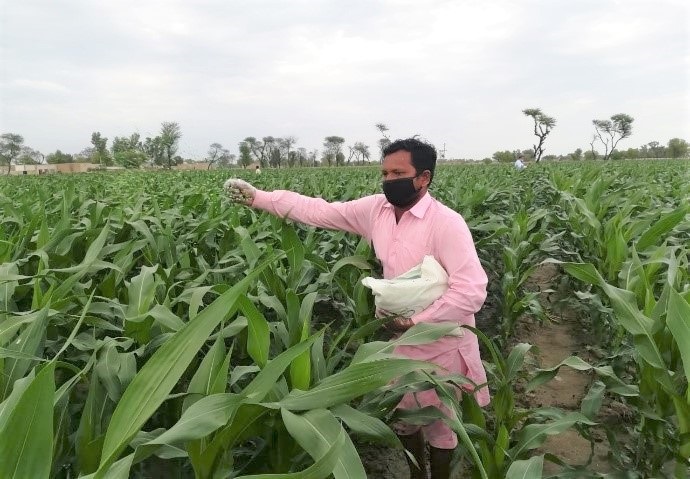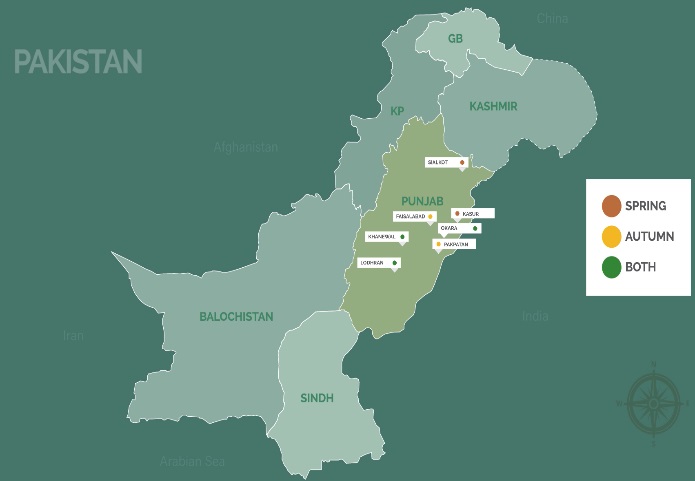
CABI, along with its partners Rafhan Maize Products Co. Ltd and with the support of the National Agricultural Research Centre (CDRI, ASI), are busy evaluating the efficacy of AflaPak™ in Pakistan – a biological control agent/product for outcompeting the strains of aflatoxin producing Aspergillus flavus in maize.
Currently, field trials of AflaPak™ are being conducted in seven maize growing districts of Punjab province. The purpose of these trails is to compile baseline data for registration and commercialization of the product across the country.
Initially soil samples were collected prior to the application of AflaPak™. These pre-samples will enable scientists to evaluate the soil profile of that particular field. Knowing the exact crop stage is vital for AflaPak™ application and subsequently its success, which is about 14 days before tasselling with 10-12 visible leaf collars present until the onset of active silking.

This product is broadcasted once in a cropping season with a recommended dose of 04-05 Kg per acre to protect the maize from aflatoxin contamination from plot to plate. There are some precautionary measures for the AflaPak™ application which advise wearing full Personal Protective Equipment (PPE), using it only outdoors or in a well-ventilated area, not mixing with fertilizers, insecticides, fungicides or any other pesticide for spreading and not breathing in dust.
Other safety steps include not ingesting the product, eating, drinking or smoking while handling it as well as avoiding it entering the eyes where irritation will occur. Users are also recommended to thoroughly wash their hands with soap and water after it is applied and before eating, drinking or going to the toilet.
AflaPak™ consists of friendly fungi spores which arrive early in the field and start producing its spores before the bad fungus can establish itself in field conditions. Once the friendly fungi are established, they will continue to resist the toxin-producing fungi from contamination of maize grains.
AflaPak™ not only outcompetes bad fungi in field conditions but also has carry over effects and keeps working during harvest, transportation and storage. This prevention of contamination is a huge advantage for farmers as well for the maize processors.
Alongside the application of AflaPak™, other good practices, such as proper drying of crop and good storage conditions, can add more value to the maize crop.
Additional information
Main photo: AflaPak™ is applied to a maize field in Depalpur, Punjab (Credit: CABI).
Aflatoxin Control Programme
Find out more about CABI’s work on aflatoxin control in Pakistan.
Authors:
Dr Sabyan Faris Honey – Project Manager
Contributors:
Dr Hamzah Shahbaz Bhatti
Dr Muzammil Farooq
Mr Saqib Ali
For more information, please contact:
Deborah Hamilton
USDA
202-720-0335
Deborah.Hamilton2@usda.gov
1 Comment
Leave a Reply
Related News & Blogs
Sindh farmer gains global recognition for sustainable cotton farming innovations
Photo credit: Evronas/Better Cotton. Location: Better Cotton Conference, Istanbul, Türkiye, 2024. Sindh farmer Fateh Muhammad Laghari has gained recognition for his commitment to sustainable cotton farming practices as part of the Better Cotton Member…
5 December 2024





Sir,
I am curious how the friendly fungi resist the toxin-producing fungi from contamination of maize grains.
Can you produce an animated video for this process.
Thanks